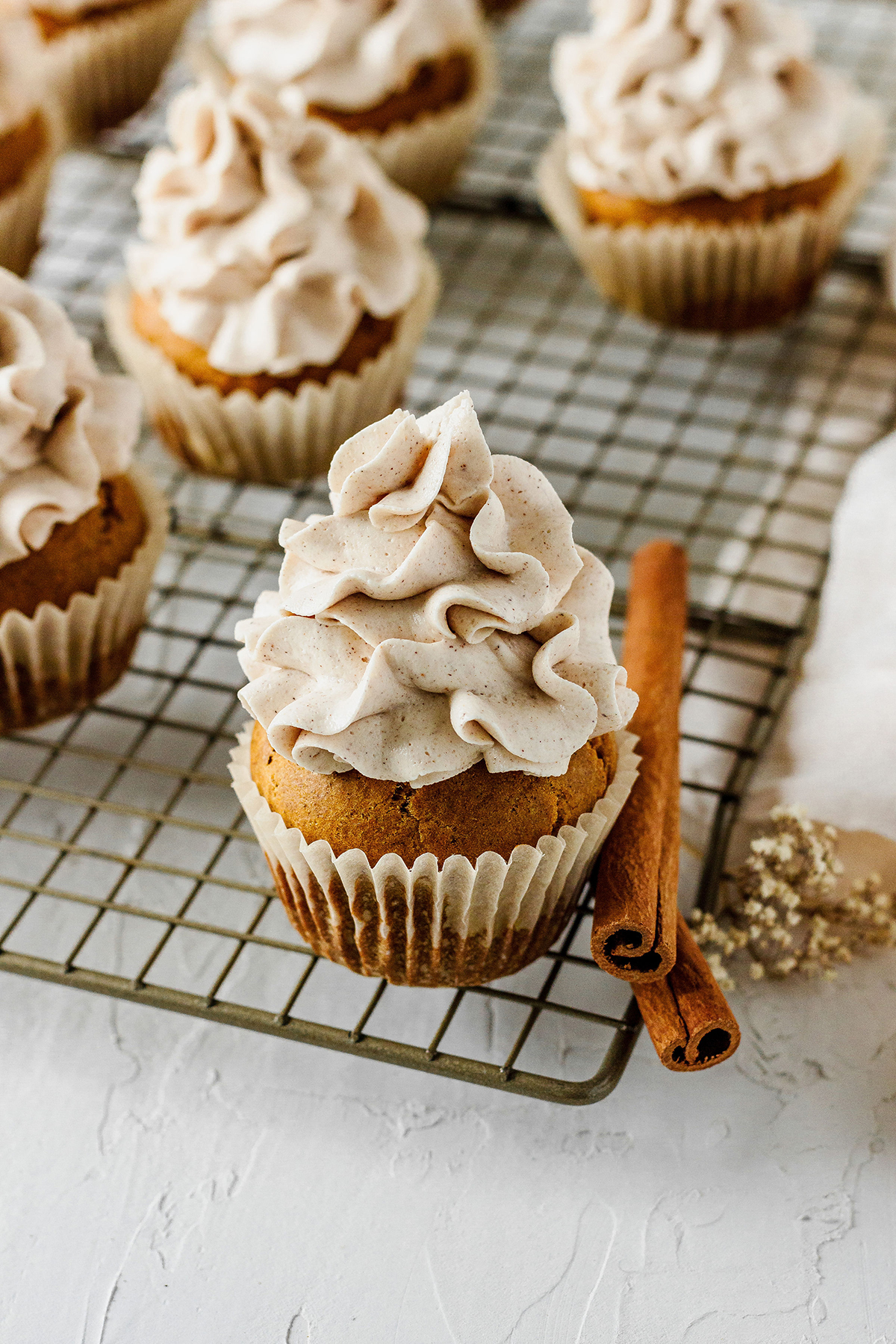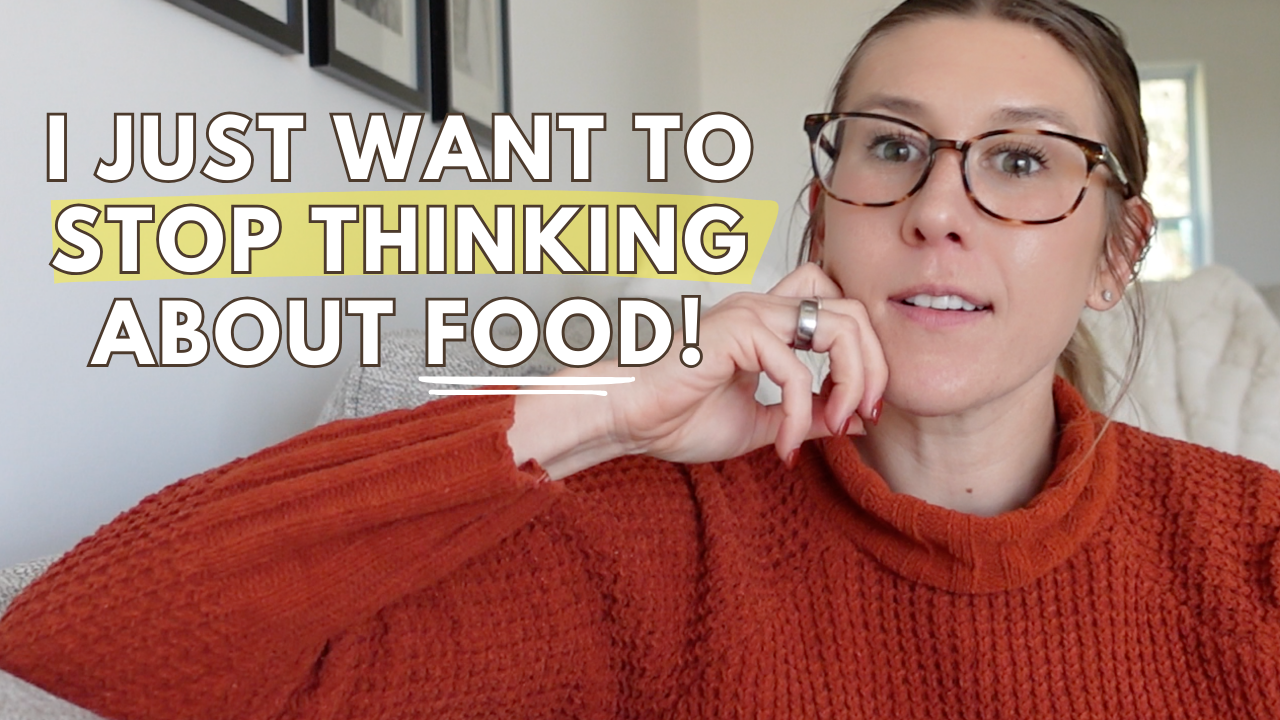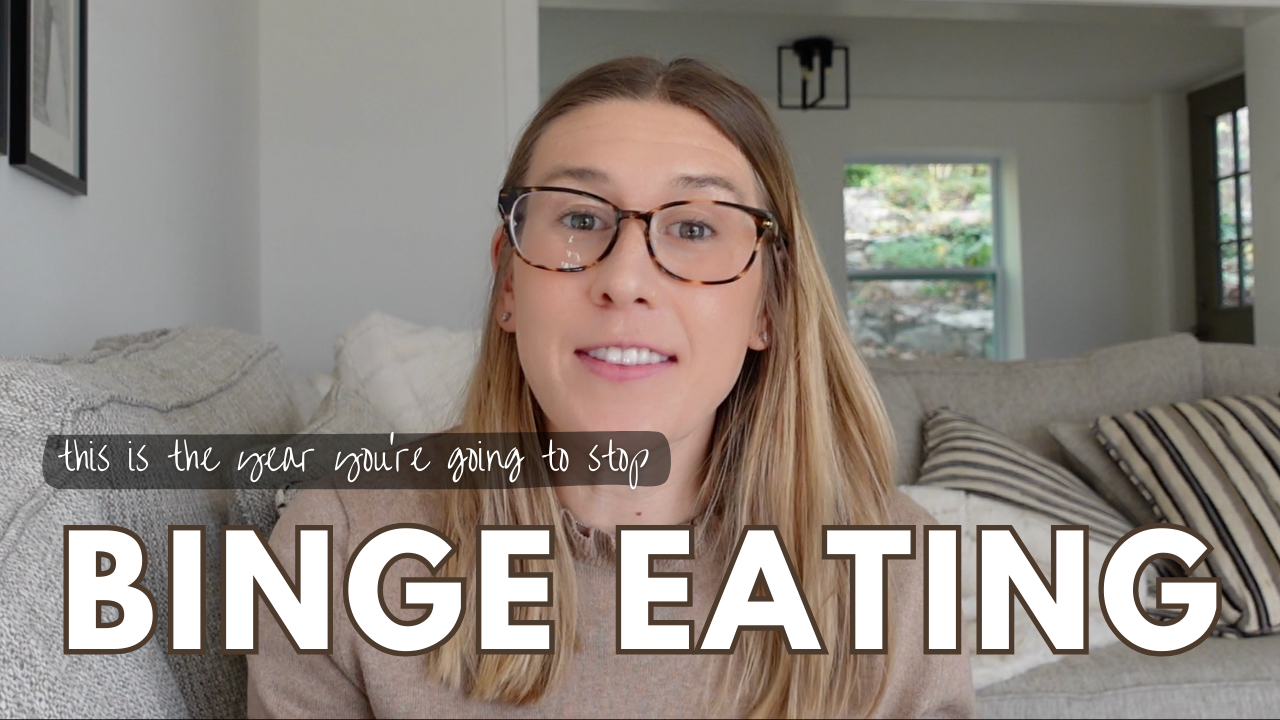Cracking the Binge Eating Puzzle: 7 Questions to Uncover the Why
December 10, 2021

Hey There, I'm Ryann Nicole.
I’m a recovered binge eater who changed the story from something that happened to me to something that happened for me. Now, I’m a licensed therapist teaching you to do the same.
My mission? To help you ditch food stress and live your life with mental peace and freedom every single day!
How often have you found yourself stuck in the same cycle, promising that binge eating won’t happen again, only to see it repeat itself—5 times? 10 times? Maybe it feels like a never-ending loop of 100 or more times. Before you dive into self-blame and shame, let’s shift the perspective.
7 Questions To Ask After A Binge
Grab a notepad and a pen, because it’s time to decode the reasons behind your binge eating. Let’s ask ourselves some essential questions to uncover the ‘why’ and pave the way for growth and transformation.
#1: Did You Eat 3 Meals Today?
Or yesterday for a Morning/Mid-Day Binge? If the answer is no, this could be a key contributor to your binge. Reflect on what you could do differently next time to ensure you get in those three meals. Perhaps it’s about planning your day more effectively or having some healthy snacks at the ready.
#2: Have You Been Weighing Yourself and/or Counting Calories?
If the answer is yes, it might be a factor driving your binge eating. Consider what you could do when the urge to weigh yourself or count calories strikes. Perhaps it’s time to shift your focus away from these numbers and concentrate on how you feel instead.
#3: Were You Satisfied/Full After All Meals and Snacks?
If the answer is no, it’s another potential trigger for bingeing. Explore what you could do differently when you feel unsatisfied with a meal or snack. It could involve mindful eating practices or experimenting with different foods to find what truly satisfies you.
#4: Did You Allow Yourself to Get Overly Hungry?
If the answer is yes, this might be a significant reason behind your binge. Contemplate what steps you can take to prevent yourself from getting too hungry next time. Regular, balanced meals and healthy snacks can help avoid those ravenous moments.
#5: Did a Broken Food Rule Set You Off?
Or did you say to yourself, “I’ll eat better tomorrow?” If the answer is yes, it’s crucial to recognize that rigid food rules can be a catalyst for binge eating. Explore what you can do differently when you’re faced with a food rule. Maybe it’s time to challenge these restrictions and cultivate a more flexible approach to eating.
#6: Did You Judge Any of Your Food Choices Today?
If you answered yes, it’s essential to acknowledge that negative or judgmental thoughts about your food choices can contribute to bingeing. Consider how you can challenge and reframe these thoughts. Self-compassion and self-acceptance play a significant role here.
#7: Have You Ever Worked with Someone to Help You with This?
If you’ve never sought professional help, it might be an indicator that deeper-rooted emotional healing and work is needed. It could be time to consider working with a therapist or counselor who specializes in this area. If you’ve already worked with someone, it might be worth exploring the possibility of adding another professional with different expertise to provide fresh insights and support.
Takeaway
These seven questions are not the ultimate and final checklist, but they serve as an excellent starting point to kickstart your journey in comprehending the triggers behind your binge episodes. Each question holds a piece of the puzzle, and by addressing them, you can embark on a journey of self-discovery and growth.
10 Things To Add To Your Coping Box
Just so you know, I do review everything I recommend. When you buy through links on this page, we may earn a commission.
An emotional coping box, also known as a self-soothe or comfort box, is a personalized collection of items that can help individuals cope with difficult emotions, stress, or challenging situations. It’s a tangible and accessible resource that provides comfort and distraction during moments of distress. Here are 10 things you can consider adding to your emotional coping box:
Include items that bring you comfort, such as a soft blanket, stuffed animal, or cozy socks. These tactile objects can provide a sense of security and grounding.
Write down or print out affirmations and positive quotes that resonate with you. Reading these affirmations can help shift your mindset and promote self-compassion.
Incorporate items that engage your senses, such as scented candles, essential oils, or stress-relief lotion. Pleasant scents can have a calming effect.
Include small items like stress balls, fidget spinners, or textured toys. These can serve as a physical outlet for nervous energy and help redirect focus.
Keep a journal or notebook to write down your thoughts, feelings, and reflections. Journaling can be a therapeutic way to express and process emotions.
Include pictures of loved ones, happy memories, or items that hold sentimental value. Visual reminders of positive experiences can bring comfort and perspective.
Guided Relaxation or Meditation Resources
Include a small audio player or device with pre-loaded guided relaxation or meditation sessions. These can help you practice mindfulness and manage stress.
Playlist of Uplifting Music
Create a playlist of music that brings you joy or relaxation. Music has the power to influence mood, and having a go-to playlist can be a quick mood booster.
List of Coping Strategies
Write down a list of healthy coping strategies that work for you. This could include deep breathing exercises, progressive muscle relaxation, or simple activities that bring you a sense of peace.
Remember, the contents of your emotional coping box should be tailored to your preferences and needs. Regularly review and update the items to ensure they remain effective for you over time. The goal is to have a readily available toolkit that supports your emotional well-being during challenging moments.
check out the pod
Ways I Can Support You
01 Coaching
Intimate group coaching to break free from binge eating
02 podcast
Real talk on food, mindset shifts, motherhood, and finding peace.
03 support group
A safe space to connect with others on the same journey.
04 free coaching
Have real conversations and hear others share their struggles.
Ryann Nicole
Licensed Therapist, Certified Nutritionist, and Virtual Wellness Coach
Ryann is a licensed therapist and virtual wellness coach who has assisted individuals worldwide in establishing a healthier relationship with food and their bodies.
Are You Ready to Heal Your Relationship With Food?
I understand—it can be overwhelming to figure out where to begin. Let's simplify things and have you start right here:
Why Am I Overeating?
First Steps To Stop Binge Eating
The Ryann Nicole
Podcast
FREE QUIZ
FREE GUIDE
Podcast
the food freedom lab podcast




